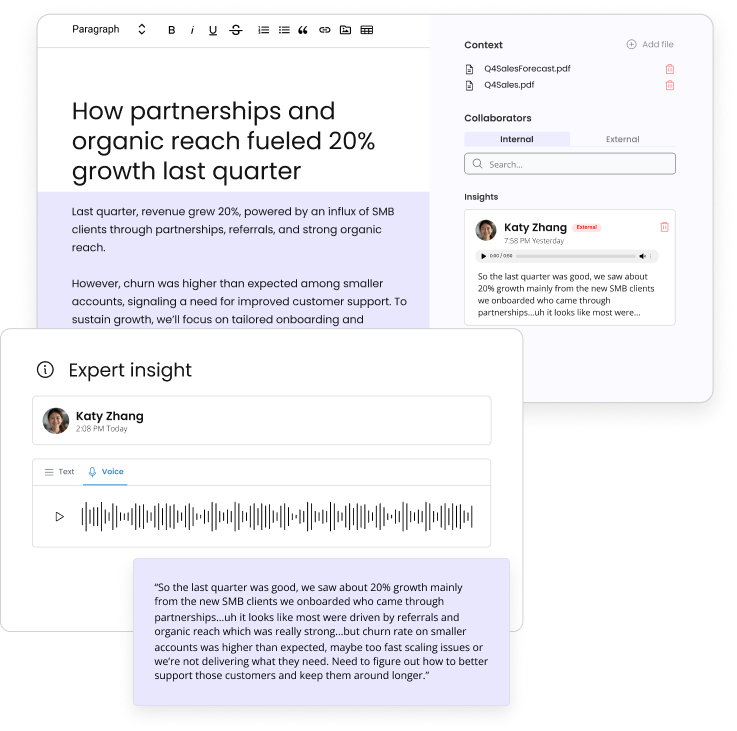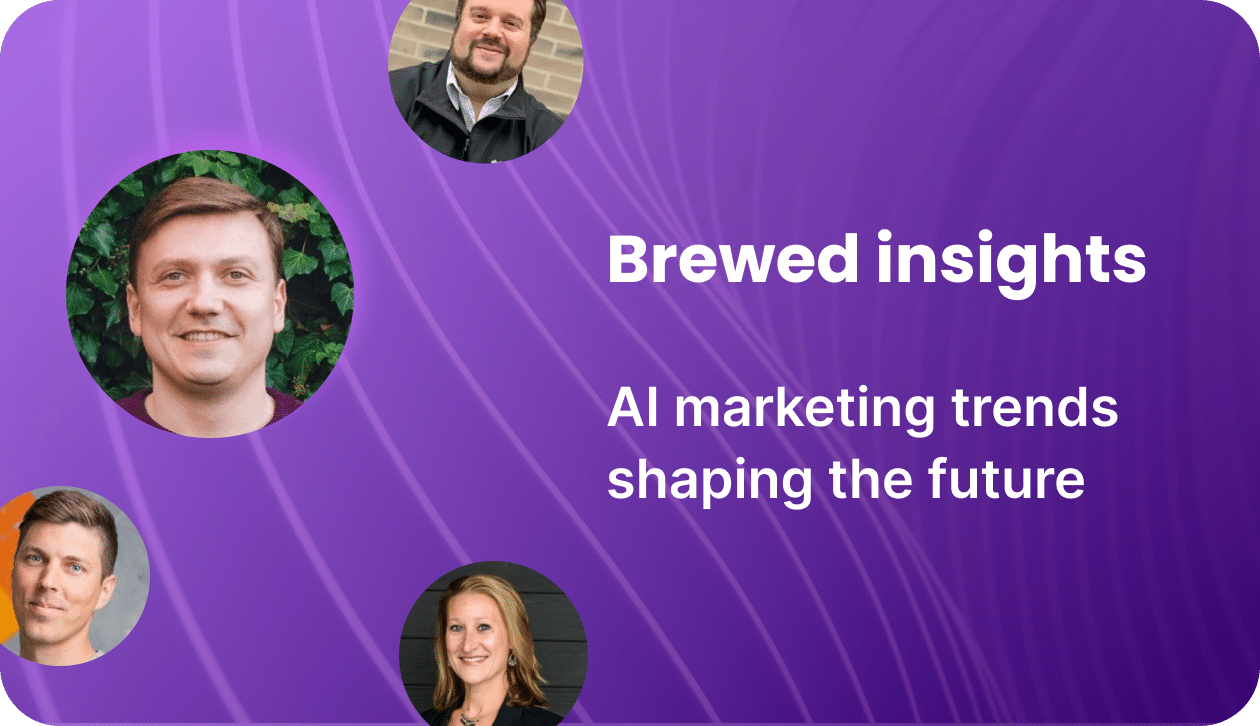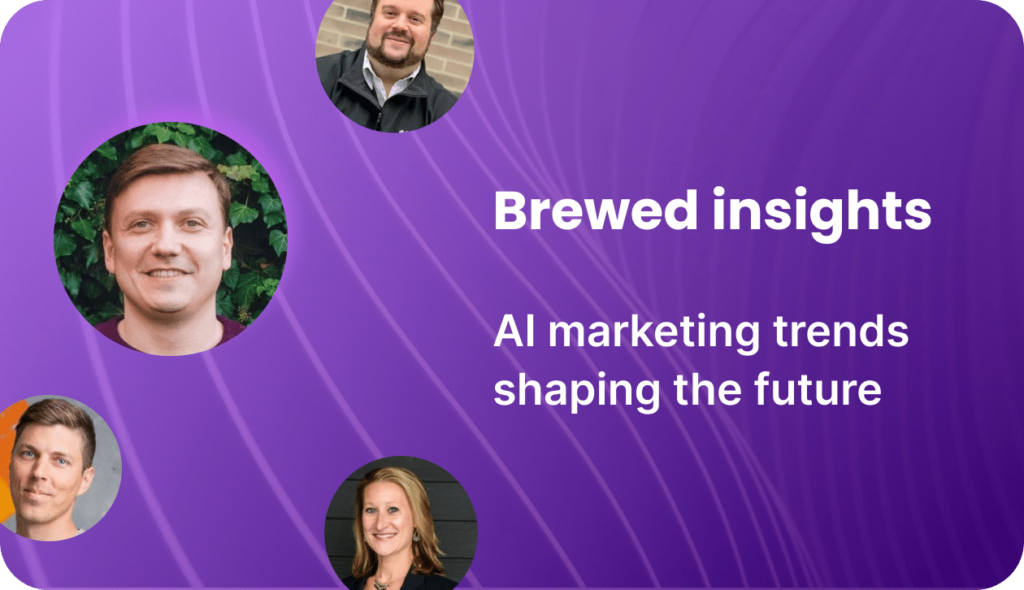Table of Contents

Authority scales when expertise comes first
Wordbrew helps teams collect expert insight before AI ever writes a word.
Built for expert-led, review-safe content
- Home
- »
- Content Marketing
- »
- AI marketing trends that will shape the future
-
Wordbrew
- 6 minutes read time
AI marketing trends that will shape the future
- Home
- »
- Content Marketing
- »
- AI marketing trends that will shape the future
AI marketing trends that will shape the future
Table of Contents

Why understanding AI trends is central to your marketing strategy
As the first quarter of 2024 draws to a close, it’s clear that artificial intelligence (AI) is fundamentally changing how we connect with our audiences.
With every new tool and algorithm, we see how uncertain the future of AI is, serving as a reminder that caution is needed to successfully harness the latest trends in AI.

Photo by Steve Johnson on Unsplash
The potential is clear, as AI marketing trends leverage the latest technology to craft messages that resonate on an unprecedented scale. But avoiding the noise of low-quality content is proving challenging, as the “wild wild web” is overcome with lookalike, one-click-wonder AI fluff.
We’ve already unpacked the marketing trends to follow in 2024, and now, we’re approaching it with an artificial intelligence lens. With the support from industry leaders and their market insights, we’re revealing the current trends in AI that will shape the future.
TL;DR
- AI is reshaping marketing, making strategies smarter and more personalized, but also raising challenges in content quality and authenticity
- AI is transforming SaaS tools into intelligent agents, revolutionizing SEO, content creation, and customer relationship management with unparalleled efficiency
- Google’s March update shows the growing backlash against low-quality, AI-generated fluff, making it essential to prioritize authenticity and substance
- Algorithms are turning social media into a powerful search and engagement platform, changing how information is discovered and interacted with
- As AI can produce content with one click, the authenticity of human-produced content and expert insights is key to performance in a post-AI world
The integration of AI in every aspect of marketing
We’re just beginning to grasp the full extent of how AI is reshaping the marketing world. It’s no longer lurking in the background but taking center stage—transforming how we strategize, engage, and ultimately win over our audiences. This rapid evolution shows a full-blown revolution in AI marketing strategy, sharpening every tool in the marketer’s toolkit.
But while the tools are sharp, integrating them smoothly demands balance and skill. One of the experts we interviewed shared that it requires a “blend of art and science through the use of AI.” The most effective tools are groundbreaking, but their true potential is only unlocked when expertly managed, applied, and mastered.
We all know that businesses and people who use AI will replace people who don’t. This fact isn’t due to a looming showdown between humans and robots but is an acknowledgment of the speed and scale AI gives marketers, leaving more time for strategic work to deliver truly meaningful content for their audiences.

The explosion of sub-par AI-generated media
A tsunami of AI-generated content is sweeping across every media platform. For digital marketers who can now speak their visions into existence with just a few clicks, this shift is nothing short of a miracle. However, this easy execution doesn’t come without risks—especially with 7.5 million blog posts published daily.
Another expert noted that the amount of lookalike junk is inevitable because of the abundance of access to information. We have endless opportunities to create great AI-led content, yet for every groundbreaking piece of content, there are three times that amount in utter mediocrity.
We’re in the era of AI fake news and dangerous deep fakes, where seeing is no longer believing. OpenAI just released Sora, its latest venture into text-to-video technology. The buzz is real—but so are the worries. The lines between real and AI-generated content are blurring, and the power to shape narratives and sway public opinion has never been more potent.
Using AI for marketing in 2024 requires careful steering and a steady hand. Now, more than ever, we have to question what we see online.
How SaaS is innovating tools with AI marketing trends
Software as a Service (SaaS) tools are leading the use of AI for business. We’re witnessing a seismic shift where, as said by Ilya Telegin, “we’ll see a transformation from ‘marketing tools’ or ‘SaaS in general’ to AI agents.” This statement is unfolding right before our eyes. Traditional tools that once offered static solutions are evolving into intelligent agents capable of thinking, learning, and revolutionizing the way we connect with our audiences.
Machine learning, natural language processing, and predictive analytics are now standard features, not optional extras. SaaS tools are now at the forefront of this innovation, offering marketers data with insights and automation informed by intuition. It delivers the right message, to the right person, at the right time, with a level of precision and personalization that was once science fiction.
But what does this mean for marketers? AI-powered SaaS tools are transforming the way we approach SEO, content creation, customer relationship management, and more. These tools are like team members, working 24/7 to analyze trends, predict outcomes, and tailor strategies in real time.
Marketers can now anticipate customer needs, craft more engaging content, and optimize campaigns for maximum impact with unprecedented efficiency. This is the new normal in the digital marketing world: a landscape where AI and SaaS tools are leading characters, driving innovation, and setting new standards for excellence.
Fighting for quality against digital noise

Maintaining a balance between quality and quantity has never been more critical. With the backdrop of this technological boon, we’re experiencing “more fluff in what we already have, where it’s difficult to discern what is relevant, and what is promoted by search engines based on consistent output” (Marcus Sean Tan). This echoes the growing concern over the steady rise of dead content that lacks substance.
The Google March update should help with this, stopping spam blog posts in their tracks. Authenticity is essential, as marketers must provide quality content that elevates the standards of what we contribute to the digital ecosystem. In this quest for quality, AI tools are used as instruments for crafting meaningful, relevant, and engaging content that stands out in an oversaturated market.
Social media is leading the way in search and engagement
Comparatively, social media stands as the new frontier in AI-powered search and engagement, reshaping the way we discover, consume, and interact with content. The sophisticated algorithms and machine learning technologies that underpin AI propel this transformation.
Chloe Nicholls points to a seismic change in how information is sought and found, observing that “one of the biggest trends is the evolution of organic and paid search.” Social media platforms were once spaces for casual sharing and social interaction. Now, they are pivotal tools in the search for information and marketing, rivaling traditional search engines in influence and efficiency.
This shift is not accidental but a direct result of AI’s integration into these platforms, making them smarter, more intuitive, and incredibly adept at presenting users with the content they seek or didn’t know they were interested in. The implications for marketers and content creators are vast. Now, we must understand and leverage these AI-driven search capabilities to enhance visibility, engagement—and ultimately—impact.

Social media success now requires a keen understanding of AI’s role in shaping trends, behaviors, and content discovery. As social media continues to redefine the parameters of search and engagement, embracing AI’s potential to connect and captivate becomes a necessity for those looking to thrive in the digital domain.
The value of authenticity and expertise in AI-era marketing
As AI generates content at the click of a button, a new currency is rising in value: authenticity and expertise. The internet may be saturated with content, but not all content holds the same weight; not all words are written equal. The craving for genuine, human-generated content intensifies as AI continues to refine its ability to mass-produce increasingly legitimate-sounding content.
Johannes Karjula noted that “with the rise of AI-driven content, the authenticity of human-generated content will become more valuable.”
This is a direct response to the challenge of using an increasingly complex information ecosystem. AI tools, including ChatGPT and Bard, have brought incredible advancements, but they also introduce a new dilemma: the spread of false information or “hallucinations”.
Marketers and content creators are called upon to blend AI’s capabilities with the irreplaceable depth and nuance of human insight. This elevates their brand’s trustworthiness while contributing to a digital environment grounded in truth, enriched by real expertise.
How to ride the AI wave without sacrificing quality
It’s essential to strike the perfect balance between cutting-edge technology and the desire for speed with an awareness of the value of authenticity. Pivotal AI marketing trends are shaping our future. It’s time to redefine our strategies and the very way we think about engagement and content creation.
Embracing AI requires a mix of optimism and caution. AI is exciting, so we should use it with creativity and excitement, but making the wrong move could damage your brand’s reputation. Wordbrew combines the power of AI with that essential human touch needed to keep content trustworthy, with authenticity, legitimacy, and quality at the forefront of every word.
From the explosion of AI-generated media to the innovative leaps in SaaS, we’ve reviewed some of the most challenging trends in AI marketing. Despite these difficulties, one thing rings clear: If we harness the power of AI effectively, there is no limit to what we can achieve.
This article was created with Wordbrew
